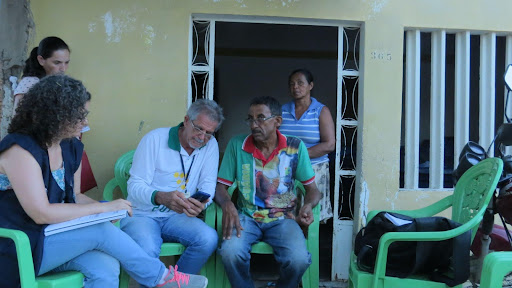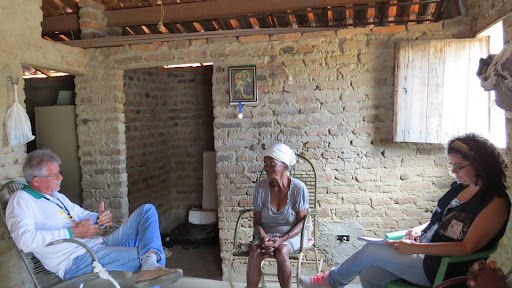Addressing Racial and Ethnicity-based Discrimination and Strengthening the Protection of Rural Afro-descendants
UNFPA supports data disaggregation as a tool to fight racism and ethnic discrimination
Challenges
About one in four Latin Americans self-identify as Afro-descendant today. Afro-descendants are over-represented amongst the poorest populations in the region especially those living in rural settings.
According to the Brazilian National Quilombo Coordination Offices, Quilombolas are ethnic-racial groups that have their own historical trajectory, endowed with specific territorial relations, with Afro-descendant ancestry related to resistance to the historical oppression suffered. They represented spaces where it was possible to maintain their cultural traditions and be free from colonial oppression. There are over 3000 Quilombo communities in Brazil today and many of the current rural African descendant communities in Brazil still reside in Quilombo. During slavery, Quilombo represented areas of resistance and freedom for Afro-descendent. They served as places of refuge, where unique culture and religion could be practiced. In 1988, the Brazilian constitution granted land rights to the descendants of these first Quilombo habitants. Despite this change in the constitution, and due to persistent racism, structural discrimination, and legal barriers, a vast majority of Quilombo communities still do not have land rights. It was only in 2018 that the Brazilian Supreme Court recognized legal mechanisms for accessing the right of land rights for these communities.
Despite some advances in the last decade, many Quilombo communities in Brazil still lack basic services and commodities such as running water, electricity, and access to safe and reliable roads. Heavy rains on poorly maintained roads often cut these population groups from accessing important social and health services. Poor access to basic services like running water, leads to inadequate sanitation and higher likelihood of transmission of life-threatening water diseases. It also increases girl’s school dropout and absentee rates due to limited access to water sanitation including for menstrual hygiene.
Education is compulsory for children between 6 and 14 years of age. Afro-Brazilians, though, have some of the highest rates of illiteracy. The majority of non-enrolled students in primary education tends to be in marginalized, rural communities including Quilombo communities. Education plays a central role in lifting communities out of poverty but in Quilombo, children do not have access to education and they are being robbed of future opportunities, including sustainable formal employment, financial and housing security. Low access to all levels of education, coupled with racism and structural discrimination are one of the main causes of inter-generational poverty for these communities.
There is also a general lack of health services available for these communities. Afro-descendant women in Brazil are 2 to 3 times more likely to die of preventable maternal health causes. In Quilombo, communities’ access to maternal health is difficult. Pregnant women have to travel long distances for examinations and access to quality specialized maternal care, including midwifery, prenatal and postnatal services. Another determining factor in access to health care for women of African descent is related to Institutional Racism. Even if they manage to get care at the health service centers, these women are less touched/cared for and receive less guidance. Additionally, members of the community also lack identity cards which prevents them from accessing important social services, including health and cash based-services. Inclusive disaggregated data that takes into account the location and numbers for these populations is an important and sin qua non step to address these inequalities.
Towards a Solution
The United Nations Population Fund (UNFPA) continues to advance the transformative promise of Leaving No One Behind within the context of the 2030 Agenda and the Sustainable Development Goals (SDGs). In the context of our work at the regional level, in Latin America and the Caribbean our actions have been undertaken to guarantee the health and well-being of Afro-descendant women, girls, and young people as well as scaling-up targeted programmes and innovation for addressing socio-cultural, economic, political, and structural catalysts of exclusion and marginalization of the Afro-descendant population.
In response to identifying the gap in providing basic services including health, education, sanitation etc. UNFPA worked closely with the Brazilian Institute of Geography and Statistics (IBGE) to facilitate the participation of Quilombola people in the process of their inclusion in the national demographic census. Four consultations were carried out between July 2018 and November 2019. In these consultations, the methodology for applying the question on ethnic-Quilombola belonging was reviewed.
Facilitating factors in those consultations include UNFPA’s recognized leadership in evidence generation, partnerships established with local NGOs and Government as well as participation of the Quilombola population in the design of the methodology.
More specifically people and Institutions involved in the process include, UNFPA Brazil Country Office, Government of Brazil, Brazilian Institute of Geography and Statistics (IBGE), Coordenação Nacional de Articulação das Comunidades Negras Rurais Quilombolas (CONAQ), Local NGOs, and academics institutions.
Furthermore, UNFPA also shared lessons learned from other countries, provided technical expertise, and served as an external observer. This helped ensure all peoples are accounted for and build a body of evidence that drives inclusive and equitable policies and practices. UNFPA’s facilitation was important to ensure the methodology developed for the 2020 demographic census included the Quilombola communities in an accurate and respectful way. With UNFPA Brazil’s technical support, a question was included on ethnic-Quilombola membership in the national census, which will significantly increase the statistical and geographic visibility of this traditional population. With specific data for this population, it will be possible to develop socioeconomic indicators in areas such as health, education, labor market, income, living conditions, among others.
Few challenges were observed during the ongoing process but prompt solutions against the challenges were implemented in an effective way. The census was postponed in 2020 as a result of the COVID-19. However, the Federal Supreme Court recently passed a decision calling for the State to carry out the demographic census in June 2022. The process was time-consuming and complex. However, representatives from both sides acknowledge that this important participatory process led to a methodology that is acceptable to all and helps the community to be included in service provision and policy-related decision-making processes.
This project was possible under the knowledge sharing project between Brazil, Cabo verde, Cote D’Ivoire and Senegal that enabled participant countries to learn from one another local realities and improve national capacity to collect and use data as a strategic tool to address national priorities and needs. The lessons learned from this initiative of inclusive census through data disaggregation can be shared further to interested countries in the region and beyond.
Contact Information
Ms. Patricia da Silva, Programme Adviser, People of African Descent Initiative, Policy and Strategy Division, UNFPA | Ms. Luana Silva, UNFPA Brazil
Countries involved
Brazil, Cabo Verde, Côte D’Ivoire, Senegal
Nominated By
United Nations Population Fund (UNFPA)
Supported By
UNFPA Brazil, UNFPA People of African Descent Initiative team at Headquarters
Implementing Entities
National Coordination of Quilombolas Communities (CONAQ)
Project Status
Ongoing
Project Period
2017
Sectors
Gender Equality and Empowerment of Women, Migration, Peace and Development, Population, Digital Transformation
URL of the practice
https://www.unfpa.org/advancing-equity-and-social-justice-people-african-descentPrimary SDG
10 - Reduced Inequalities
Secondary SDGs
01 - No Poverty, 02 - Zero Hunger, 03 - Good Health and Well-being, 05 - Gender Equality, 06 - Clean Water and Sanitation, 11 - Sustainable Cities and Communities, 16 - Peace and Justice Strong Institutions
Primary SDG Targets
10.1 10.2 10.3Similar Solutions













